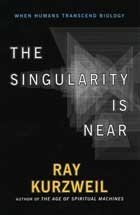My Recommendation for a Great Book about the Future
The Singularity Is Near: When Humans Transcend Biology by scientist and futurist Ray Kurzweil is one of the most important books I’ve read in years.
I was in my 30s when I read Alvin Toffler’s Future Shock and The Third Wave, and they were epiphanies for me. Toffler discussed the physical, psychological, and social effects of scientific and technological change and the logical consequences of technology and the possibilities of a Digital Age and a wired world that he foresaw with visionary eyes.
The Singularity Is Near had the same effect on me as Toffler’s books—only EXPONENTIALLY (I use this word because, as Kurzweil sees it, EXPONENTIAL growth in knowledge is at the heart of our future)! My takeaway from this illuminating book is that our present is going to look substantially different every few years as opposed to every few decades! Evolution will be at the level of knowledge merging with technology, biology, and artificial intelligence for the benefit of the human species.
Kurzweil’s vision is based on the premise that technological progress is appearing at an accelerated pace, an exponential speed, meaning that it increases more and more rapidly. It took three million years for humans to move from hunting and gathering to domesticating their environment; the Stone Age was thousands of years; the Industrial Revolution started in the late 1800s, and less than 100 years later humans landed on the moon.
Moore’s Law
The digital world uses Moore’s Law, which says that the number of transistors that can fit into a given amount of space will double about every eighteen months and the products will go down in price. So, if at a certain point 100 transistors can fit into a specific amount of space, eighteen months later 200 transistors will fit into that space; eighteen months after that, 400 transistors will fit, and on and on, with the cost going down each time.
Kurzweil uses Moore’s Law as a metaphor for the exponential rate of technological progress. He defines the singularity as the point in time when humans will merge with these exponential advances of technology to change human life forever. In a sense, we will merge with the products of the Digital Revolution, and technological progress will be so rapid, that human intelligence by itself, without the aid of technology, will not be able to follow it. Kurzweil says that the singularity will happen by 2045. In an interview, he said that “the non-biological intelligence created in that year will be one billion times more powerful than all human intelligence today.”
Until now, evolution has been on a platform of DNA. Every living organism’s DNA is thought to come from the DNA of a common primordial slime. Kurzweil maintains that scientists are learning how the brain works and digitally replicating it. I think about this in terms of voice technology: twenty years ago, the first voice technology processed just a few words; today my cell phone’s “Siri” seems to understand everything I say.
Downloading and Processing Data at Unimaginable Speed
Kurzweil explains that computers will work one million times faster than the human brain, with the ability to instantly and accurately download exact data to an infinite number of computers that will be able to collectively solve problems we humans can’t even imagine. For us humans to “download” our “data,” we have to download it to one another verbally or in written form, and each of us processes the information differently, with variations in our interpretations of what’s been written or said. It’s clumsy and time consuming. Imagine connecting networks of millions of computers sharing exact concepts instantaneously!
Extending Our Lives
Kurzweil believes that machines will ultimately apply human logic in their thinking and problem-solving, opening up vast unknown universes beyond our current comprehension. He suggests that, in theory, we will be able to recreate our thoughts, memories, and the rest of our consciousness into some form of life that isn’t restricted by our body’s current limitations. He believes that microscopically small technology, known as nanotechnology, combined with advances in genetics and robotics, will allow us to live extremely long lives. He also believes future advances will solve hunger and health problems.
The book is filled with possibility and hope for a future wildly beyond my current understanding—and, best of all, after finishing the book, it all holds water to me.
- 20 Feb, 2014
- Posted by Steve Fogel
- 0 Comments



COMMENTS